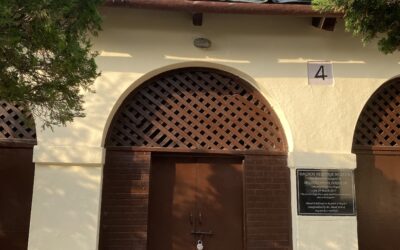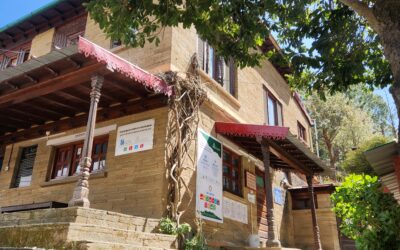Ratna Tai* walked ahead, leading a coterie of her fellow villagers to the farming lands where they planned to grow Kareli (Bitter gourd). She walked briskly while we struggled to catch up with her pace, jumping over thickets and bushes, ducking wild branches and crossing a small brook on our way to the fields.
Fields that had been recently cleared down in Kapni (harvest season) and were dotted only by remaining half-cut paddy stalks. Some of the patches had already been sown with a new crop of Kardhanye (cereals) like Val (beans) and Chawli (black eyed peas). Soft tender shoots had started to emerge from the soil. We surveyed the 8-acre land and knew that it required some mowing and tilling before it could be ready for growing Karelis…along with people’s aspirations.
Ratna Mohan Waghmare is the chairperson of Self Help Group named Chetna Mahila Vikas Bachat Gat which comprises of 12 women from the village of Nivi Muthaoli Adiwasiwadi in Raigad, Maharashtra. In her 60s, Ratna Tai, as she is popularly known, has emerged as Pudhari (leader) in her village. Not only has she rallied support to form a self help group and saved money by monthly contributions but has also taken part in a livelihood initiative by investing those savings. Last year, post paddy-harvesting, they delved into vegetable cultivation for the first time as an alternate source of income in agricultural off-season.
To initiate the cultivation project and to make her SHG members self-reliant and self-dependent, it was decided to take a loan, half the amount of which was sanctioned from the welfare organization – Sarva Vikas Deep while the other half was contributed from the SHG savings.
Sarva Vikas Deep is working in Mangaon taluka of Raigad, for the upliftment of Katkari community under the guidance of its director, Father Richard Quadros. “It is crucial to make them an equal stakeholder in this process of setting up sustainable livelihoods”, Father Richard said when I asked him about the support given in the form of interest-free loan, farming techniques, water pumps, seeds & fertilizers know-how.
The significant outcome last year, was an income generation of 4 Lakh rupees which was duly distributed among SHG members. Encouraged by the success, they decided to venture into vegetable cultivation this year again which is why I was there with Father Richard and others for reconnaissance of farming lands where they planned to grow the crops. After introducing me to the SHG members, Father Richard briefed me about the project detail. In the end, he told me that the loan provided this year will not cover the cost of water pumps. Here’s why:
“…Because we provided them the pumps last year. They should know to maintain and use the same. Also, next year, we’ll not cover the cost of seeds, and the year after that, the cost of fertilizers and so on till they are independent and capable to undertake the initiative on their own.”
I marveled as I realized that the idea is not only about providing a means of livelihood but also about overall empowerment and making them financially literate to better use their money. Among us was also Babita Waghmare, a Katkari tribal from the neighboring Rudrawali village and a member of another SHG, getting a first-hand account of the success story of vegetable cultivation at Nivi Muthaoli. Inspired, she with other members of her SHG were planing to foray into vegetable cultivation this year in their village, while receiving similar financial and logistical support from Sarva Vikas Deep. Seeing her interacting and asking questions from Ratna Tai and others was heartening and encouraging. We need more such SHGs in Katkari community, who can serve as an example and a source of inspiration to others.
*Names changed to protect identity




Hi Prateek,
These articles on Katkaris are well articulated and gives the historical and current context of tribe.
I would like to connect with you for some more information on the tribe.
Kindly suggest any feasible way for the same.
Thanks.
Hi Manzer,
Thanks for your commendation.
You can reach out to me at prateek.dwivedi@csamumbai.in